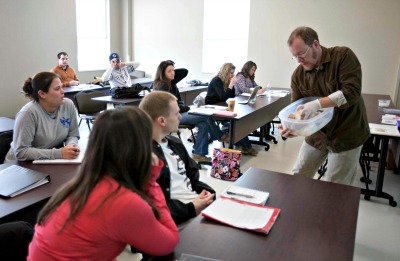M.S. in Psychology - Psychological Sciences
The Psychological Science concentration of the Master of Science in Psychology is a 2-year, 36-credit hour research mentorship concentration designed to prepare individuals for continuation in a Ph.D. program and/or for positions where strong research and quantitative skills are needed. There are courses and training in the following areas: biobehavioral psychology, clinical science, cognitive psychology, and developmental science. A thesis is required. You should refer to faculty research interests identified on the Research Labs webpage and apply specifically to work with up to three faculty members whose research is of particular interest to you. Note that the number of students who can work in any one lab is constrained by lab space and other factors.

This concentration offers research opportunities in learning and memory, perception, neuroscience, child development, cognitive aging, social psychology, sport psychology, emotion, and educational psychology. The concentration is designed to strengthen your quantitative skills and provide you with research experience that will make you more competitive when applying to Ph.D. programs in psychology and/or for positions where these skills are required. Strong research and quantitative skills are particularly important for students who intend to pursue a doctoral degree. A survey of graduate school selection committees showed that research experience was rated as the most important criterion for admission into a doctoral program after the three primary selection criteria of GRE scores, undergraduate grade point average, and letters of recommendation (Keith-Spiegel, Tabachnick, & Spiegel, 1994). The survey also indicated that research experience was equally important for experimental and clinical doctoral programs.

The success of our graduates is based on three integrated components of the concentration:
- You will be actively involved in research throughout the program. The research-oriented curriculum will allow you to gain valuable research experience and will provide you with opportunities to collaborate with your research mentor on paper presentations and journal publications. There is a weekly research colloquium at which you will make presentations about your previous or ongoing research.
- Class sizes are relatively small. Small class sizes allow faculty members to spend more time with you both in the classroom and in one-on-one advisement. Because faculty members will come to know you well, they will be able to write detailed letters of recommendation for you. These letters are one of the top three selection criteria for Ph.D. programs.
- Faculty members are active professionally. The members of our faculty have active research programs, they present their research at national and international professional meetings, and they publish in peer-reviewed journals. In addition, several are ad hoc reviewers or are on the editorial boards for professional journals. Thus, faculty members have a large network of colleagues that will facilitate placing you into a Ph.D. program.
For general information on graduate programs at WKU visit the Graduate School.
References: Keith-Spiegel, P., Tabachnick, B.G. & Spiegel, G.B. (1994). When demand exceeds supply: Second-order criteria used by graduate school selection committees. Teaching of Psychology, 21, 79-81.
Have questions? Contact the M.S. in Psychology, Psychological Science Concentration Coordinator: Dr. Diane Lickenbrock

Psychological Sciences
Some of the links on this page may require additional software to view.

